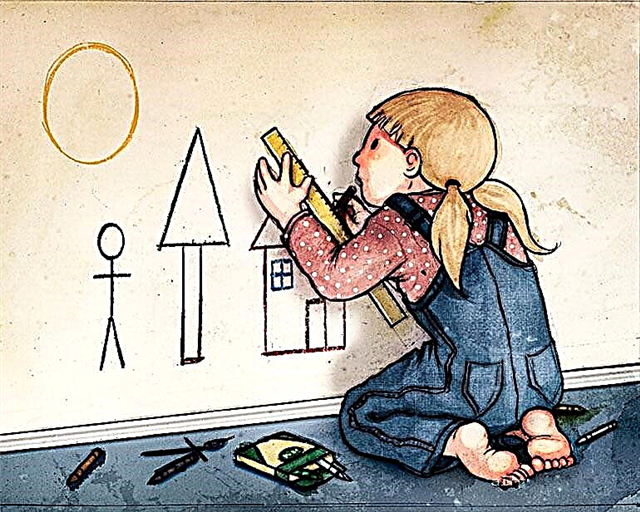Among young mothers, conversations often arise about bad pediatricians. Such discontent is not uncommon now, but what are its true reasons? Do you know how to talk to a children's doctor?

Faith or Distrust?
Patients are primarily people, and therefore the attitude towards medical personnel is different for everyone. Some may like the doctor that puts others in shock. Unconditional trust in the doctor is either the life setting of a particular person or a visit to an appointment on the recommendation of friends.
In most cases, however, mistrust occurs. It is not clear why, but many mothers prefer to visit the local pediatrician "for show" and do not even take the therapy they prescribed seriously. At the same time, they prefer to treat their children in paid clinics. Why do you need a policy then? This "piece of paper" entitles you to free medical assistance.
Know how to ask
A standard situation - a mother leaves the pediatrician's office, realizes that she has not understood anything of what has been said and begins to "walk" on the Internet. And especially on the forums. Dear mothers! There are people on the forums just like you, but by no means specialists. Eliminate this situation from your life.
You need to be able to ask. Ask any question that worries you. Feel free to clarify, especially points such as:
- the essence of the diagnosis;
- possible consequences of the disease;
- methods of treatment.
Be sure to ask about the lifestyle that the baby should lead during the period of illness:
- is it possible to visit crowded places;
- bathing will not adversely affect;
- sleep mode, etc.
By the way, the doctor is obliged to answer all your questions. And this obligation is enshrined in the legislation of the Russian Federation.
Phrases to help you:
- Please tell us more.
- Doctor, we are very worried about this, can you clarify some points?
- We understand that the time for an appointment is limited, but please explain to us what this diagnosis means.
Take note! The physician should not draw conclusions from the actual examination. He should definitely ask you about the child's behavior and physical abilities at home.
Preparing for a visit to the doctor
You are a mother, which means that the slightest change in the well-being or mood of the child will not escape from you. When planning to visit a pediatric doctor, it is important to tell him everything in detail, then the diagnosis will not cause difficulties. Therefore, before going to the pediatrician, you need to prepare a little, namely:
 Take some time to observe the baby. Try not to do other things during this period so as not to overlook anything. Then you will be able to find out what alarmed you, and tell the doctor with confidence about your observations and suspicions.
Take some time to observe the baby. Try not to do other things during this period so as not to overlook anything. Then you will be able to find out what alarmed you, and tell the doctor with confidence about your observations and suspicions.- All the symptoms that you noticed in the child must be voiced by the pediatrician. A detailed story about a baby is half the success in making a diagnosis. Even if the baby coughed only once, you shouldn't forget about it anyway.
- Moms who talk only about anxieties and doubts are perceived by doctors as anxious persons who may think too much. Start the story with positive moments, tell what the baby already knows and knows. Then, in the eyes of the pediatrician, you will not appear anxious, but an observant mother who is able to distinguish the slightest changes in the development or behavior of the child.
Try not to ask the last questions. Any question asked at the door after the appointment ends will entail advice to come again.
We voice all doubts and worries
Life without the Internet is not the same. Noticing some deviations in the health or mood of the child, mothers immediately "plunge" into the vastness of the worldwide network and begin to diagnose themselves. Remember the following:
- Do not look for answers on the forums, it is better to voice your concerns to the doctor.
- Only a specialist and only with a personal examination is able to make an accurate diagnosis.
- Stop worrying, just have a good talk with your doctor and ask him about everything in detail.
- Any good doctor is able to dispel your doubts, not just in words, but also to confirm them in practice. Does it seem to you that your baby is hard of hearing? An experienced professional can prove to you that this is not the case.
Additional counseling
Do you have doubts? Try to get an alternative opinion. See another doctor, or rather several. Then the picture will be clearer, and you will be sure that everything was done correctly.
In order not to torment the baby once again with all sorts of tests and procedures, take a medical history and copies of all tests in your clinic. You have the right to do so, defend it if necessary.
Note! You should not refuse to take the prescribed drug if the annotation to it does not indicate the possibility of its use for the age category of your crumbs. Often there are no other analogues for such drugs, their safety is confirmed by the positive experience of taking the drug in children of a younger age category. Why is this not in the description? Yes, because the text of the instruction was approved by many authorities and changing it is too expensive a procedure for a pharmaceutical company.
Rights violated?
If this happens, do not panic. The algorithm of actions is quite simple:
- In a calm voice and even tone, remind medical personnel of your rights and, accordingly, their responsibilities. Any screams and tantrums can be further interpreted not in your favor.
- Does not help? Calm again. We go to the chief doctor of the polyclinic (or department) and write a complaint. Do not forget to describe in detail the essence of the situation and indicate which rights were not implemented.
- If this does not work, we begin to involve employees of the MHIF, the insurance company that issued you the policy, a higher health care institution and even the prosecutor's office.
In all these instances, it is advisable to write a detailed written complaint with a request not to "let" the issue go to your own clinic for consideration.
Trust the forums less
A lot of noise in the network was caused by a story about a good-for-nothing mother who, instead of going to the doctor, “went” to the forum. As a result of this “treatment,” her 4-month-old daughter died. Do you want to repeat this mistake? We have already said that there are people on the forums just like you. You cannot call them specialists, so why trust them the most precious thing? In addition, most of the laudatory reviews are custom-made and are written specifically to raise the rating of a particular clinic.
[sc: rsa]
To be fair, we note that some of the reviews were written by real people. But after all, the perception of the same event is different for everyone, so one and the same hospital will be scolded by some, while others will praise. And some young mothers, in addition, are not able to distinguish good deeds from beautiful "candy wrappers". For example, mom was well fed in the hospital. Positive emotion and comfort overshadowed minor health problems of the baby, but she will still leave a positive review. And in another hospital, the nannies did not stand on ceremony with anyone, but the children are all healthy. But my mother was psychologically uncomfortable, so she writes negative about the employees of the institution.
Don't trust your child's health to dubious people and their equally dubious advice.
What do you need to clarify?
First of all, any mother should know the name of the diagnosis given to the child. In addition, it is worth asking the doctor the following points:
- what are the symptoms of the disease specifically in your child;
- what studies and analyzes can confirm or deny the diagnosis;
- possible causes of the disease;
- how often the pediatrician has encountered such a disease in practice;
- the nature of the further development of the disease, what will happen to the child and what the consequences may be;
- with what drugs the doctor is going to treat the child, what analogues they have and why we will treat with this particular remedy;
- what side effects may occur when taking the prescribed funds;
- the influence of the prescribed drugs on the digestive system, intelligence and emotional balance of the child;
- are there any other methods of treating the disease, in addition to those already mentioned;
- when prescribing expensive studies, it is worth finding out, in addition to the cost, what this test is for, how to prepare and how long it takes, what the child will feel and the possible consequences of the study;
- best and worst predictions.
Learn about preventive measures for other family members. Especially if you still have children. And in some cases, it is worth voicing your desire for a consultation with a specialist of a narrower profile. You can also insist on conducting additional studies, such as ultrasound or MRI. At the same time, your pediatrician should not have a single drop of indignation about checking the diagnosis. A self-respecting doctor responds adequately to the patient's desire to hear another opinion.
The pediatrician showed how to instantly calm a crying child. Technique "HOLD" R. Hamilton
Health. How do you choose a good doctor?
You can understand whether your pediatrician is a good one by how the doctor prescribes medications, whether he takes into account the health of the parents when diagnosing a child, whether he adheres to the rules of hygiene and, most importantly, whether you understand the recommendations of a specialist. What else should you know when choosing a pediatric doctor?

 Take some time to observe the baby. Try not to do other things during this period so as not to overlook anything. Then you will be able to find out what alarmed you, and tell the doctor with confidence about your observations and suspicions.
Take some time to observe the baby. Try not to do other things during this period so as not to overlook anything. Then you will be able to find out what alarmed you, and tell the doctor with confidence about your observations and suspicions.

